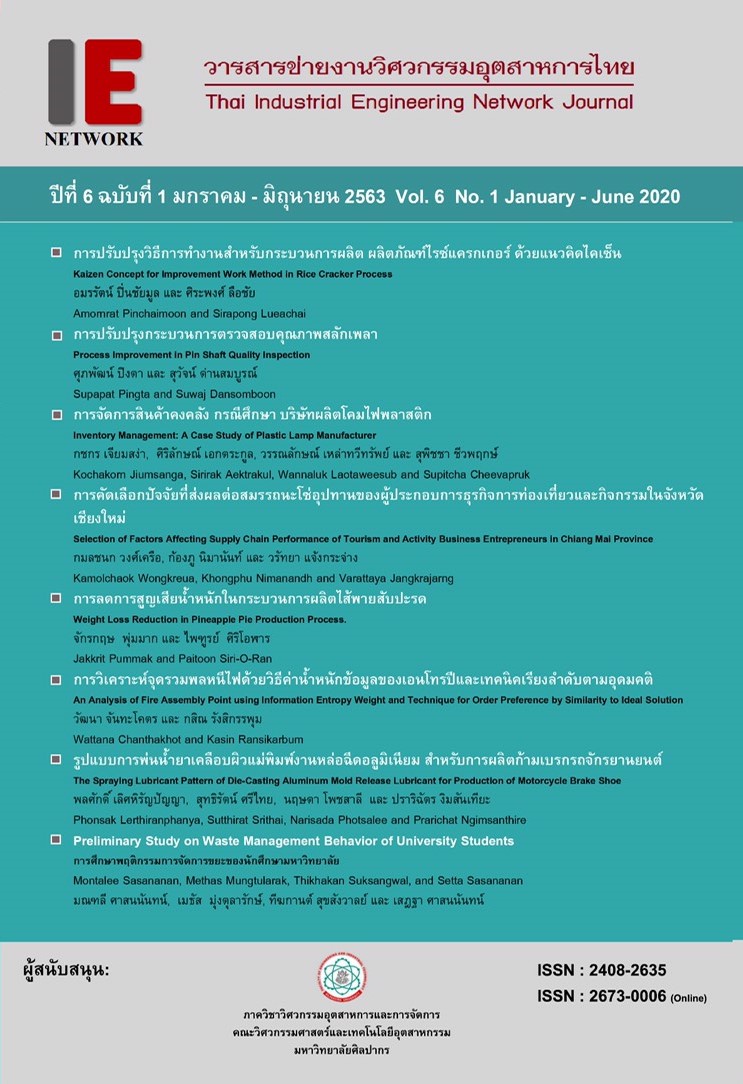Preliminary Study on Waste Management Behavior of University Students
Main Article Content
Abstract
This article presents an overview of waste management behavior and factors affecting waste management behavior of undergraduate students at Thammasat University, Thailand. Data collection was conducted by using questionnaire survey of 265 samples. Statistics used in data analysis were percentage, mean, t-test, one-way analysis of variance, and Least Significant Difference method. The study revealed that most students had good level of understanding in waste management. The respondents engaged in waste sorting, reuse, recycling, rejection of hazardous materials, and repair at moderate level. However, waste reduction behavior was practiced at relatively high level. The hypothesis test showed that there was no significant difference in waste management behavior of male and female except for recycling. Women recycled wastes at notably larger degree than men. Social science students engaged in waste reduction at substantially higher degree than science and technology counterparts. Those in the 5th year or higher practiced waste management at significantly lower degree than students in the other years. The type of residents had substantial effect on waste management behavior. Students living at home engaged in more intensive waste management practice than those living on campus and nearby apartments. Waste management knowledge had no effect on waste segregation, reduction, and recycle. This implies that such behaviors may be induced by relatively short-term approach such as providing waste separation facilities. However, reuse/repair/rejection were significantly influenced by waste management knowledge so educational campaign should be implemented in order to enhance those types of behavior.
Article Details
บทความ ข้อมูล เนื้อหา รูปภาพ ฯลฯ ที่ได้รับการตีพิมพ์ในวารสารฯ ถือเป็นลิขสิทธิ์ของวารสารฯ หากบุคคลหรือหน่วยงานใดต้องการนำทั้งหมดหรือส่วนหนึ่งส่วนใดไปเผยแพร่ต่อหรือเพื่อกระทำการใดๆ จะได้รับอนุญาต แต่ห้ามนำไปใช้เพื่่อประโยชน์ทางธุรกิจ และห้ามดัดแปลง
References
[2] Wheeling K., “The EPA blames six Asian nations that the U.S. exports plastic waste to for ocean pollution”, Pacific Standard, July 15, 2019
[3] Barr S., “Factors influencing environmental attitudes and behaviors: A U.K. case study of household waste management”, Environment and Behavior, 39, 2007, 435-473
[4] Stern P.C., Dietz T., Guagnano GA., “The new ecological paradigm in social psychological context”, Environment and Behavior, 27, 1995, 723-743
[5] Sidique S.F., Lupi F., Joshi S.V., “The effects of behavior and attitudes on drop-off recycling activities”, Resource, Conservation and Recycling, 54, 2010, 163-170
[6] Seunghae L., Paik H.S., “Korean household waste management and recycling behavior”, Building and Environment, 46 (5), 2019, 1159-1166
[7] Barr S., Gilg A.W., Ford N.J., “Differences between household waste reduction, reuse and recycling behavior: A study of reported behaviours, intentions and explanatory variables”, Journal of Environmental and Waste Management, 4, 2001, 1-14
[8] Pettifor H., “Patterns of household practice: An examination into the relationship between housework and waste separation for households in the United Kingdom”, ISER Working Paper Series, 2012, 2012-14
[9] Miafodzyeva S., Brandt N., “Recycling behaviour among householders: synthesizing determinants via a meta-analysis”, Waste and Biomass Valorization, 4, 2013, 221-235
[10] Schwab N., Harton H.C., Cullum J.G., “The effects of emergent norms and attitudes on recycling behavior”, Environment and Behavior, 46, 2014, 403-422
[11] Derksen I., Gartell J., “The social context of recycling”, American Sociological Review, 58, 1993, 434-442
[12] Tonglet M., Phillips P.S., Read A.D., “Using the theory of planned behavior to investigate the determinants of recycling behavior: a case study from Brixworth, UK” Resource, Conservation and Recycling, 41, 2004, 191-214
[13] Loan L.T.T., Takahashi Y., Nomura H., Yabe M. “Modeling home composting behavior toward sustainable municipal organic waste management at the source in developing countries”, Resources, Conservation and Recycling, 140, 2019, 65-71
[14] Baldassare M., Katz C., “The personal threat of environmental problems as predictor of environmental practices”, Environment and Behavior, 24, 1992, 602-616
[15] Steel B.S., “Thinking globally, acting locally? Environmental attitudes, behavior and activism”, Journal of Environmental Management, 47, 1996, 27-36
[16] Segun C., Pelletier L.G., Hunsley J., “Toward a model of environmental activism”, Environment and Behavior, 30, 1998, 628-652
[17] De Young R., “Some psychological aspects of recycling: the structure of conservation satisfactions”, Environment and Behavior, 18, 1986, 435-449
[18] Gamba R.J., Oskamp S., “Factors influencing community residents’ participation in commingled curbside recycling programs”, Environment and Behavior, 26, 1994, 587-612
[19] McKenzie-Mohr D., Oskamp S. , “Psychology and sustainability: An introduction”, Journal of Social Issues, 51(4), 1995, 1-14
[20] Minelgaitė A. and Liobikienė G., “Waste problem in European Union and its influence on waste management behaviours”, Science of the Total Environment, 667, 2019, 86-93
[21] Suntree J., Study of factors relating to environmental conservation behavior of Pathomasoke villagers, Nakhon Pathom Province [Master’s Thesis]. Mahidol University 1988 (In Thai)
[22] Padilla A.J. and Trujillo J.C., “Waste disposal and households’ heterogeneity. Identifying factors shaping attitudes towards source-separated recycling in Bogotá, Colombia”, Waste Management, 74, 2018, 16-33
[23] Yi G., Lee J, Hong W., “A study on the discharge properties and a unit of municipal solid wastes in residential area types: case study of Taegu City”, Proceedings of Annual Conference of the Architecture Institute of Korea 2000. Seoul, Korea
[24] Park J., Park S., Kwon G., “Generation characteristics of residential wastes according to house types by separated collection of food waste – in case of Kyungju City”, Korean Solid Wastes Engineering Society, 17 (2), 2000, 166-76
[25] Schultz P.W., “Strategies for promoting proenvironmental behavior”, European Psychologist, 19, 2014, 107-117.
[26] Mintz K.K., Henn L, Park J., Kurman J., “What predicts household waste management behaviors? Culture and type of behavior as moderators”, Resources, conservation & recycling, 145, 2019, 11-18
[27] Bernstad A. “Household food waste separation behavior and the importance of convenience”, Waste Management, 34(7), 2014, 1317-1323
[28] Kaiser F.G. and Wilson M., “Assessing People’s General Ecological Behavior: A Cross-Cultural Measure”, Journal of Applied Social Psychology, 30 (5), 2006, 952-978
[29] Sidique S.F., Joshi S.V., Lupi F., “Factors influencing the rate of recycling: an analysis of Minnesota countries”, Resource, conservation and recycling, 54, 2010, 242–249


